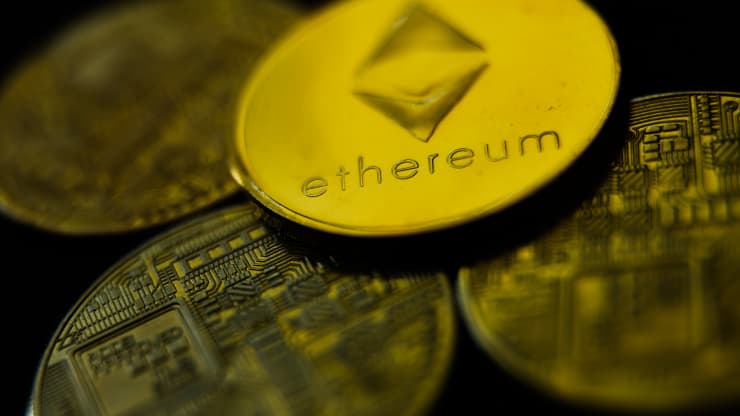摘要: The fast-growing decentralized finance industry could be about to get a rude awakening.

▲圖片來源:Jakub Porzycki | NurPhoto | Getty Images
KEY POINTS
- After a crackdown on Binance and other cryptocurrency firms, regulators are now turning attention to the world of decentralized finance.
- Decentralized finance, or “DeFi,” lets users take part in traditional financial activities like lending but with no middle men involved.
- Regulators are concerned about DeFi services marketing themselves as decentralized when that may not be the case.
The fast-growing decentralized finance industry could be about to get a rude awakening.
Decentralized finance, or “DeFi” as it’s commonly referred to, is a trend in cryptocurrencies that first started gaining traction in 2020.
It’s been called the “Wild West” of crypto — hoards of computer programmers trying to bring traditional financial products such as loans to the blockchain.
The idea sounds promising. In theory, anyone could lend and borrow digital money at competitive interest rates, with no middle men involved. Investors are lured by the promise of earning up to double-digit percentage yields on savings in certain digital tokens.
But with major hacks and scams plaguing the space this year, regulators are becoming increasingly worried about the risk of crime as well as harm to consumers.
“I think they’re going to pay more attention to the space,” Sid Powell, co-founder of DeFi lending platform Maple Finance, told CNBC.
Almost $90 billion has been deposited into Ethereum-based DeFi protocols so far, according to data from The Block.
“It’s probably inconceivable that you have meaningful growth of DeFi which does not need to complement existing regulation in future,” Powell said.
Regulators have already started taking a tougher approach to the crypto industry.
Various countries have attempted to boot out Binance, the world’s largest digital currency exchange, for operating without their authorization. Since it has no official headquarters, Binance has so far managed to avoid scrutiny — though the company says it now wants to be a friend, not foe, to regulators.
Meanwhile, Coinbase in September got into a heated war of words with the U.S. Securities and Exchange Commission over a planned interest-earning savings product, which the regulator felt looked too much like a security. Coinbase later dropped plans to launch the feature.
And just this week, a long-awaited report from the U.S. government called on Congress to introduce regulation for stablecoins, digital assets pegged to traditional currencies like the dollar to maintain a stable value.
Now, DeFi appears to be next in line.
Earlier this year, the Wall Street Journal reported that the U.S. Securities Exchange Commission was probing decentralized crypto exchange Uniswap, with officials seeking information on how investors use the platform and the way in which it is marketed.
In September, acting U.S. Comptroller of the Currency Michael Hsu likened DeFi activity to controversial practices in Wall Street that led up to the 2008 financial crisis.
“One of the biggest questions facing regulators at the moment is how to deal with DeFi,” David Carlisle, director of policy and regulatory affairs at crypto analytics firm Elliptic, told CNBC.
“How do you apply regulatory standards designed for centralized intermediaries to the world of a few marketplaces where there’s no clear centralization?”
Carlisle said one source of concern for regulators is DeFi services marketing themselves as decentralized when that may not be the case. “We see some situations where the founding teams and developers that established the protocol have influence over the governance of the DeFi network.”
Last week, global anti-money laundering watchdog the Financial Action Task Force released revised guidance on cryptocurrencies. Part of the rules call for countries to identify individuals with “control or sufficient influence” over DeFi programs.
That means some founders of DeFi start-ups could potentially become subject to rules requiring that they provide information on originators and beneficiaries in the transfer of funds.
“While DeFi protocols may offer similar functionality in financial transactions, they offer virtually none of the oversight that regulators require to ensure safe and efficient financial markets,” Rick McDonell, former executive secretary of FATF, told CNBC.
“The lack of effective surveillance creates a substantial risk for fraud, money laundering, sanctions evasions and other criminal activity within these markets.”
As for what regulators will do in response, McDonell said it’s too early to say.
“While it’s possible to read the tea leaves on the potential for regulatory action, what that response may entail in detail remains to be seen,” he said. “But some enforcement actions are already being taken.”
“Regulatory officials have made two things clear: they are supportive of the benefits that blockchain technology can confer on end-users, but they are not ready to trust the sector’s ability to manage its financial-crime risks.”
轉貼自Source: cnbc
若喜歡本文,請關注我們的臉書 Please Like our Facebook Page: Big Data In Finance


留下你的回應
以訪客張貼回應